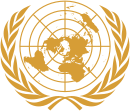| Revision as of 04:56, 21 May 2008 edit69.234.141.205 (talk)No edit summary← Previous edit | Revision as of 22:05, 13 June 2008 edit undoLapsed Pacifist (talk | contribs)18,229 editsNo edit summaryNext edit → | ||
| Line 7: | Line 7: | ||
| affirmative vote by any nine Council members. | affirmative vote by any nine Council members. | ||
| There have been two major ]s authorized by the Security Council; the 1950 ], and the 1991 ]. | There have been two major ]s authorized by the Security Council; the 1950 ], and the 1991 ]. States that breach resolutions have mixed fates. ] was swiftly attacked after failing to comply with a Security Council resolution by withdrawing from ]; however, ], ], ] and ] have been in breach of several resolutions, sometimes for decades, without having had any action taken against them. | ||
| == Terms used in the UN Charter == | == Terms used in the UN Charter == | ||
Revision as of 22:05, 13 June 2008
| Part of a series on the |
| UN Security Council resolutions |
|---|
 |
| Permanent members |
|
Non-permanent members Lists of resolutions |
| Resolutions 1 to 1000 |
(1946–1995)
|
| Resolutions 1001 to 2000 |
(1995–2011)
|
| Resolutions 2001 to 3000 |
(2011–present)
|
| Resolutions by topic |
| Vetoed resolutions |
A United Nations Security Council Resolution is a United Nations resolution voted on by the fifteen members of the United Nations Security Council; the United Nations organization charged with "primary responsibility for the maintenance of international peace and security". The UN Charter specifies (in Article 27) that a draft resolution on non-procedural matters is adopted if nine or more of the fifteen Council members vote for the resolution, and if it is not vetoed by any of the five permanent members. These members are the People's Republic of China, which replaced the Republic of China in 1971, France, the Russian Federation, which replaced the Soviet Union in 1991, the United Kingdom, and the United States.
Draft resolutions on "procedural matters" can be adopted on the basis of an affirmative vote by any nine Council members.
There have been two major wars authorized by the Security Council; the 1950 Korean War, and the 1991 Gulf War. States that breach resolutions have mixed fates. Iraq was swiftly attacked after failing to comply with a Security Council resolution by withdrawing from Kuwait; however, Indonesia, Israel, Morocco and Turkey have been in breach of several resolutions, sometimes for decades, without having had any action taken against them.
Terms used in the UN Charter
The United Nations Charter contains numerous formulations which imply the adoption of resolution while not defining it any further.
External links
- Complete list and text of all resolutions
- UN Security Council Official Website including full text of all resolutions